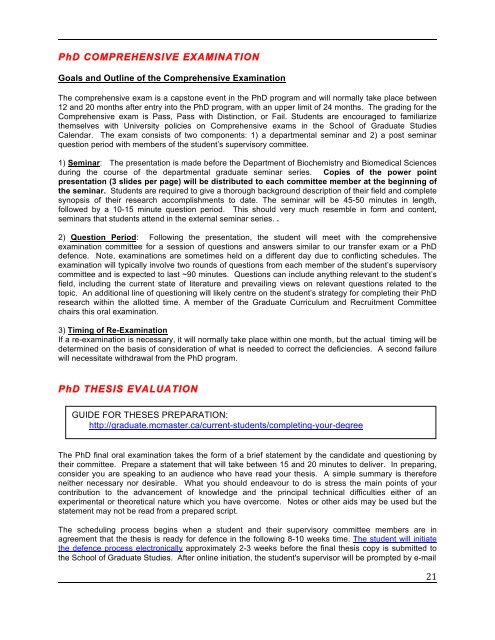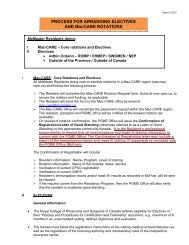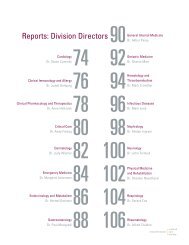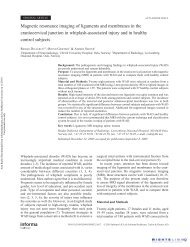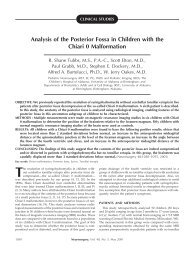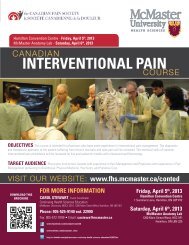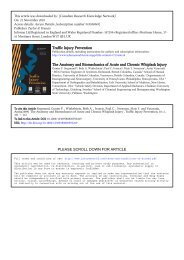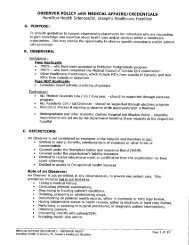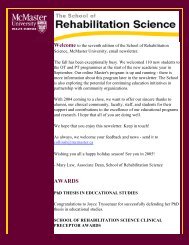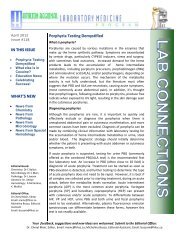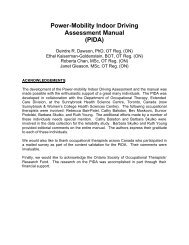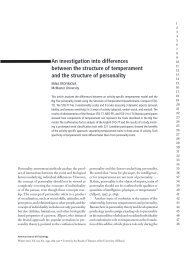Graduate Handbook - Faculty of Health Sciences - McMaster ...
Graduate Handbook - Faculty of Health Sciences - McMaster ...
Graduate Handbook - Faculty of Health Sciences - McMaster ...
You also want an ePaper? Increase the reach of your titles
YUMPU automatically turns print PDFs into web optimized ePapers that Google loves.
PhD COMPREHENSIVE EXAMINATION<br />
Goals and Outline <strong>of</strong> the Comprehensive Examination<br />
The comprehensive exam is a capstone event in the PhD program and will normally take place between<br />
12 and 20 months after entry into the PhD program, with an upper limit <strong>of</strong> 24 months. The grading for the<br />
Comprehensive exam is Pass, Pass with Distinction, or Fail. Students are encouraged to familiarize<br />
themselves with University policies on Comprehensive exams in the School <strong>of</strong> <strong>Graduate</strong> Studies<br />
Calendar. The exam consists <strong>of</strong> two components: 1) a departmental seminar and 2) a post seminar<br />
question period with members <strong>of</strong> the student’s supervisory committee.<br />
1) Seminar: The presentation is made before the Department <strong>of</strong> Biochemistry and Biomedical <strong>Sciences</strong><br />
during the course <strong>of</strong> the departmental graduate seminar series. Copies <strong>of</strong> the power point<br />
presentation (3 slides per page) will be distributed to each committee member at the beginning <strong>of</strong><br />
the seminar. Students are required to give a thorough background description <strong>of</strong> their field and complete<br />
synopsis <strong>of</strong> their research accomplishments to date. The seminar will be 45-50 minutes in length,<br />
followed by a 10-15 minute question period. This should very much resemble in form and content,<br />
seminars that students attend in the external seminar series. .<br />
2) Question Period: Following the presentation, the student will meet with the comprehensive<br />
examination committee for a session <strong>of</strong> questions and answers similar to our transfer exam or a PhD<br />
defence. Note, examinations are sometimes held on a different day due to conflicting schedules. The<br />
examination will typically involve two rounds <strong>of</strong> questions from each member <strong>of</strong> the student’s supervisory<br />
committee and is expected to last ~90 minutes. Questions can include anything relevant to the student’s<br />
field, including the current state <strong>of</strong> literature and prevailing views on relevant questions related to the<br />
topic. An additional line <strong>of</strong> questioning will likely centre on the student’s strategy for completing their PhD<br />
research within the allotted time. A member <strong>of</strong> the <strong>Graduate</strong> Curriculum and Recruitment Committee<br />
chairs this oral examination.<br />
3) Timing <strong>of</strong> Re-Examination<br />
If a re-examination is necessary, it will normally take place within one month, but the actual timing will be<br />
determined on the basis <strong>of</strong> consideration <strong>of</strong> what is needed to correct the deficiencies. A second failure<br />
will necessitate withdrawal from the PhD program.<br />
PhD THESIS EVALUATION<br />
GUIDE FOR THESES PREPARATION:<br />
http://graduate.mcmaster.ca/current-students/completing-your-degree<br />
The PhD final oral examination takes the form <strong>of</strong> a brief statement by the candidate and questioning by<br />
their committee. Prepare a statement that will take between 15 and 20 minutes to deliver. In preparing,<br />
consider you are speaking to an audience who have read your thesis. A simple summary is therefore<br />
neither necessary nor desirable. What you should endeavour to do is stress the main points <strong>of</strong> your<br />
contribution to the advancement <strong>of</strong> knowledge and the principal technical difficulties either <strong>of</strong> an<br />
experimental or theoretical nature which you have overcome. Notes or other aids may be used but the<br />
statement may not be read from a prepared script.<br />
The scheduling process begins when a student and their supervisory committee members are in<br />
agreement that the thesis is ready for defence in the following 8-10 weeks time. The student will initiate<br />
the defence process electronically approximately 2-3 weeks before the final thesis copy is submitted to<br />
the School <strong>of</strong> <strong>Graduate</strong> Studies. After online initiation, the student's supervisor will be prompted by e-mail<br />
<br />
21


